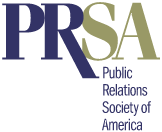PRSA Asks U.S. Senate to Block FCC Ownership Rules Change
Published 08-22-03
Submitted by Public Relations Society of America
The 20,000-member organization of corporate, government, agency, association and institutional public relations professionals and consultants said the rule adopted June 2 by the FCC on a 3-2 vote would allow one company to own broadcast stations reaching up to 45 percent of the national market. The congressional resolution will restore broadcast ownership guidelines to a maximum national market penetration of 35 percent.
"The new rules threaten the diversity and local ownership of broadcast media throughout the nation," said Steven V. Seekins, APR, Fellow PRSA, chair of the Society's Advocacy Advisory Board. "The changes promote further concentration of media ownership under large, fast-growing corporate structures reducing channels of communication. In addition, they pose a risk for the eventual disappearance of local ownership and local media voices."
PRSA advocates diversity in media ownership and believes it to be a vital component of expression in a free society. The organization's Code of Ethics has a core principle that encourages "protecting and advancing the free flow of accurate and truthful information..." that is "essential to protecting the public interest."
The FCC initiated its review of the ownership rule on Sept. 12, 2002, as part of a mandate by the Telecommunications Act of 1996. However, FCC Chairman Michael Powell called for the vote on the rule after scheduling only one public hearing on Feb. 27 for citizens and civic groups to respond directly to the six major proposed changes in broadcast media ownership regulations. Two members of the five-member commission and at least three members of the U.S. Senate asked Powell to postpone the June 2 vote to allow for more public input, but he refused.
Although the FCC vote split across party lines, opposition to the ownership rule has been bipartisan. Last month, the U.S. House of Representatives approved the provision to restore the 35 percent limit provision as part of a larger piece of legislation.
According to FCC data, five companies currently own 25 percent of more than 300 broadcast, satellite and cable channels, but because of their popularity, 80 percent of the viewing audience chooses to watch stations owned by these companies. Proponents of the FCC ownership change insist that further conglomeration of media monopolies is desirable because of increased competition for advertising dollars.
In addition to governing media ownership, the complex FCC rules also "have a potential major impact on broadcast journalists," said Seekins. "PRSA wants to ensure that journalists can continue to serve the public by meeting local needs, providing diverse viewpoints and encouraging competition locally and nationally."
"We at PRSA believe that having increasingly vast media conglomerates results in moving information generically, with less attention to opposing viewpoints, minority interests and local stories," Seekins said. "In the local media marketplace, we are already experiencing canned content, 'robot radio,' control of local venues for public entertainment and news events and growing lack of geographic focus in news reporting."
The PRSA statement appears in full at www.prsa.org/_News/leaders/statement081403.asp .
The Public Relations Society of America (www.prsa.org), based in New York City, is the world's largest professional organization for public relations professionals helping to advance the profession and the professional, with nearly 20,000 members with 17 Professional Interest Sections and 116 Chapters nationwide who represent business and industry, counseling firms, government, associations, hospitals, schools, professional services firms and nonprofit organizations.

Public Relations Society of America
Public Relations Society of America
More from Public Relations Society of America

